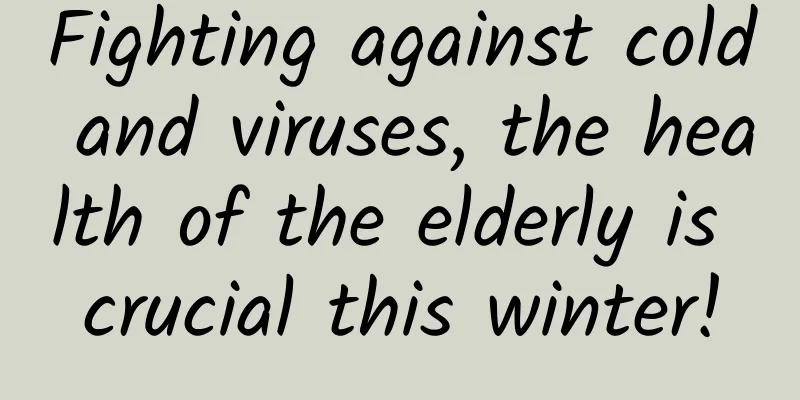Fighting against cold and viruses, the health of the elderly is crucial this winter!

|
Winter is cold, and the body's resistance is easily reduced. It is a high-incidence period for various health problems, especially for the elderly whose organ functions are gradually declining. Coupled with the threat of viruses, this winter is very unfriendly to the elderly. Therefore, in order to ensure the safety of the elderly in winter, we need to make more preparations and efforts. Image source: Baidu Gallery What physical problems are the elderly prone to in winter? 1. Low temperature problem Because the elderly's skin is not so sensitive to temperature changes, sometimes when the outside temperature is very low, the elderly may not feel cold, so their protection ability is poor. Then when the body temperature drops below 35 degrees, some physical problems may occur, such as impaired consciousness, low blood pressure, irregular heartbeat, etc. 2. Aggravate existing chronic underlying problems Many elderly people have many basic problems, such as cardiovascular and cerebrovascular problems. In winter, due to the cold and stimulation, blood vessels will constrict, blood pressure will rise, heart rate will increase, etc. In addition, the blood vessels of the elderly are relatively fragile, which will cause many existing cardiovascular and cerebrovascular problems to be induced in winter. Therefore, if the elderly at home have these cardiovascular and cerebrovascular problems, blood pressure and blood sugar must be controlled. 3. Respiratory problems Winter is the peak season for respiratory problems, and the elderly are a high-risk group for respiratory problems. Therefore, in addition to wearing masks and keeping warm when going out, the elderly should also pay attention to subtle changes in the body, and when there are signs of respiratory problems, they should be sure to deal with them promptly and correctly. 4. Easy to fracture In winter, the roads are slippery due to ice. Many elderly people cannot keep up with the pace and are prone to falling. In addition, bones are more fragile as they age, and fractures are likely to occur after a fall. Once a fracture occurs, recovery is slow and long-term bed rest is required. It will also bring many complications, such as thrombosis of the lower limb veins, bedsores, etc., which will bring many additional risks to the elderly. Image source: Baidu Gallery So, what are the things that the elderly should pay attention to when spending the winter? 1. Avoid excessive room temperature Winter weather is cold, and if the room temperature is too high, there will be a large temperature difference between inside and outside, making it easier to catch a cold and induce other health problems. It is recommended that the room temperature be between 18 and 25°C. 2. Avoid going out too early Winter mornings are cold, which can easily cause cardiovascular problems. Also, if you go out too early in the morning, there will be a thin layer of frost on the road, which can make you slip. Go out again after an hour. If there is no sunshine, it is safer to go out around 10 o'clock. 3. Avoid excessive activity Moderate exercise is good for physical and mental health, but in winter when the temperature drops, it is not advisable to exercise for too long or in excess. 4Avoid drinking and smoking It is cold outside in winter, and many elderly people like to drink alcohol to keep warm, but this can easily increase the chances of cardiovascular and cerebrovascular problems. And drinking alcohol can easily cause dizziness and fall, resulting in fractures and craniocerebral injuries. Also, pay attention to smoking less. In winter, windows are opened less for ventilation, which can make it difficult for smoke to dissipate, and long-term accumulation can affect health. 5. Avoid taking long baths The air is relatively dry in winter. In order to avoid desquamation, it is not recommended to take a bath every day. The bathing time should not exceed half an hour. Taking a bath for too long can cause dizziness and cause cardiovascular problems. 6. Pay attention to nutritional supplements After entering old age, the body loses nutrients very quickly. In order to ensure that the elderly have adequate nutrition and can meet the body's energy supply, it is necessary to replenish various nutrients in time according to their physical condition, such as vitamins, proteins, trace elements, etc. For the elderly, winter is a difficult time of the year and they need more care from others and pay more attention to their own health. |
>>: Comprehensive rehabilitation of spinal cord injuries
Recommend
Pregnant woman's legs bleeding
After pregnancy, pregnant women need to undergo e...
Can I take supplements during menstruation?
Menstruation is a normal physiological phenomenon...
What medicine can I take to discharge pelvic congestion?
If you know something about the pelvic cavity, yo...
8 behaviors that destroy your kidneys. If you don’t do any of them, your kidneys will thank you!
1. Long-term urine retention If urine stays in th...
When should I exchange my boarding pass for a flight? What should I do if my boarding pass is accidentally torn?
Friends who often fly know that the first thing w...
What is the cause of menstruation
Normal menstrual blood is dark red. Irregular men...
Symptoms of blood deficiency and wind dryness in women
Blood deficiency and wind-dryness come from the t...
How long should I take Kangfuyan capsules?
After the examination, the possibility of corpus ...
Is lower abdominal pain a gynecological disease?
Women have a high probability of suffering from g...
What are the symptoms of kidney stones in women?
Kidney stones are a common disease. Clinically, t...
Composition of the digestive system and common diseases
The digestive system is an important system of th...
Will pregnancy spots fade away?
Stretch marks are something that most female frie...
Do you need kudzu powder to make beef balls? What is the role of kudzu powder in making beef balls?
We all know that beef balls are a common delicacy...
Uterine contraction movement diagram
After ten months of pregnancy, it is finally time...
Does swimming make you darker? Why do I feel tired after swimming?
In our daily life, we often see some bodybuilders...









